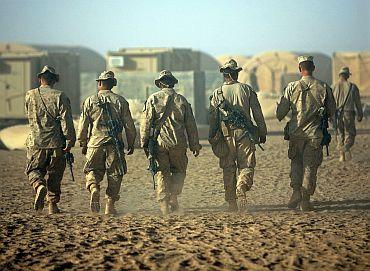 A former director-general of Pakistan's Inter-Services Intelligence has said that United States President Barack Obama will pull out American troops from Afghanistan for economic reasons rather than for strategic ones because his administration would find the ongoing surge unsustainable.
A former director-general of Pakistan's Inter-Services Intelligence has said that United States President Barack Obama will pull out American troops from Afghanistan for economic reasons rather than for strategic ones because his administration would find the ongoing surge unsustainable.
Speaking in an interview to ANI, Hamid Gul, who was the ISI chief from 1987 to 1989, said, "I think by the end of the year Obama will come up with another policy, and they are going to pull out of Afghanistan because it is not sustainable economically, casualty-wise and Taliban are winning on every front."
Gul further opined that those fighting the presence of foreign troops in Afghanistan, should not be referred to as the Taliban, but as champions of a national resistance.
"They are not Taliban, this is Afghan national resistance, and any case, they have dropped the word Taliban already. They call it the Emirate of Islamic Afghanistan. So, that is what their official name is," he said.
"So, when that thing happens, that monumental, historical event takes place, then we will be left with no choice, both India and Pakistan, to remove our friction and all these things," he added.
President Obama's AfPak strategy was announced in 2009, and the cornerstone of it is adopting a regional approach. The strategy aims to treat Afghanistan and Pakistan as two countries, but with one challenge in one region.
The strategy focuses more intensively on Pakistan than in the past, and calls for more significant increases in U.S. and international support, both economic and military, linked to performance against terror.
It also intends to pursue intensive regional diplomacy involving all key players in South Asia and engage countries in a new trilateral framework as -- at the highest levels of the countries, being Afghanistan, Pakistan and the United States.
Together, this trilateral format hopes to enhance intelligence sharing, military cooperation along the border, and address common issues such as trade, energy and economic development.
From a military aspect, the strategy has approved the sending of an additional 17,000 troops to Afghanistan, besides deploying approximately 4,000 more US troops to help train the Afghan National Security Forces so that they can increasingly take responsibility for the security of the Afghan people themselves, which is Washington's ultimate goal.
Image: US marines walk at Camp Dwyer in Helmand Province, Afghanistan Photograph: Ahmad Masood/ Reuters






 © 2025
© 2025